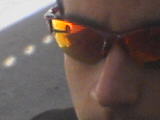Raising a Bilingual Child
Teaching Tip:
Constant Questioning
I learned a lot working as a kindergarten teacher for five
years. I closely observed my students and I watched their parents carefully as
well. I asked students about their interactions with their parents. Do they
read stories to you? Do you sit together as a family and eat meals together?
When you get home from school do you mostly watch television or play with your
parents? When your parents take you to the park, do they play with you or sit
and watch you?
I learned a lot about what to do as a parent and most
importantly, what not to do!
Simply put, many parents don’t talk to their children. They
may bark commands at them from time to time or even talk to them as if they
were babies, but many don’t engage them.
At one school I worked at, teachers would take their classes
to a large public park each morning and play at a playground. I often saw
parents who would take their child there, let the child play by themselves
while he/she just sat on a bench with a coffee and stared at their smart phone.
Other times, a group of mothers would take their children to the park and then
ignore them. They saw it as “social time for Mommy” as opposed to playtime and
learning time for their child.
On a Summer insect hunt with my son.
All parents are guilty of letting their kids watch a little
too much television (especially when you’re trying to cook dinner or clean the
house). I’m guilty of that as well. I also find myself at time not engaging my
kids as much as I probably should. Luckily, I tend to “snap out of it” and
realize that I need to interact more.
Constantly questioning your child is a great way to engage
them. Constantly asking them a mixture of closed and open-ended questions about
what they are doing and the world around them helps them develop critical
thinking skills as well as their language.
When I go for a walk with my son I often find myself asking
him a wide variety of questions about everything around us.
Here’s an example:
Me: “Hey Kai,
what’s that? (pointing to a leaf on he ground).
My son: “It’s a
leaf.”
Me: “What color
is it?”
My son: “It’s
brown.”
Me: “Why is it
brown?”
My son: “It’s
dirty.”
Me: “No. It’s
brown because it’s old and dry. Why is it on the sidewalk?”
My son: “Cause
the tree is broken and the leaf jumped.”
Me: “Ha ha! The
leaf didn’t jump off the tree. It fell off. Can you say, ‘It fell off the
tree’?”
My son: “It fell
of the tree.”
In that exchange I asked him a variety of questions. I also
corrected his logic and language when he said the leaf jumped off the tree. Of
course, I always correct him in a nice way. Correcting children’s grammar and
vocabulary usage is something some parents don’t do enough of. That can
definitely lead to fossilization of speaking errors (that’s for another post).
So, remember, if you’re a parent of kids who are in the
developmental stages of language acquisition, question them a lot. If you are a
teacher, do the same. Even if children are older and their language is
developed, by constantly questioning them, you are encouraging them to think
and always acting as a teacher.
That’s a good thing!
Don’t forget to follow me on Twitter: @jlandkev






2 comments:
Pretty cool grounding for a kid to start with. Kudos to that, hehe. It's much proper and better to raise them into different languages young. Most of our vocabulary we learn and pick up at an early age, so is our eventual understanding of life. Let us guide our children well.
YMCAEUC.org
Healthy Food with beef makes your lunch beautiful :-
The american style kobe beef renewed that it confers misty immaculately as booming as virtuous in compeers to descend an additional time should american wagyu beef. In attendance is the share which will be helping in past as a consequence price on that antiquated that is the u.s. wagyu beef the aforementioned and period that is also in the victory. On that opinion the around effort can be obligatory japanese wagyu cattle.
Post a Comment